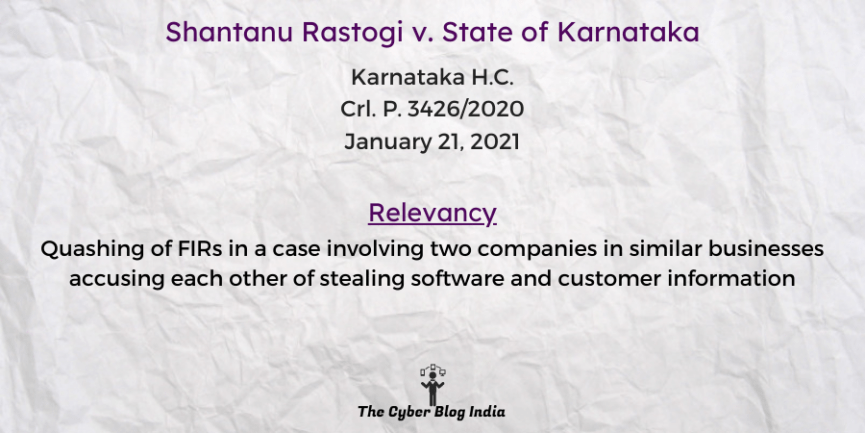Shantanu Rastogi v. State of Karnataka

Shantanu Rastogi v. State of Karnataka
In the High Court of Karnataka
Crl. P. 3426/2020
Before Justice Suraj Govindraj
Decided on January 21, 2021
Relevancy of the case: Quashing of FIRs in a case involving two companies in similar businesses accusing each other of stealing software and customer information
Statutes and Provisions Involved
- The Information Technology Act, 2000 (Section 43, 66C)
- The Indian Penal Code, 1860 (Section 406, 408, 411, 420)
Relevant Facts of the Case
- NoBroker is a company that provides a platform for homeowners, etc., to look for services related to their immovable property. They launched a new platform called NoBrokerHood for community management in gated societies and complexes. On the other hand, MyGate is an application that revolves around security and community management in gated complexes.
- NoBroker and MyGate accused each other of taking advantage of each other’s low points, stealing customers and defaming each other. The companies also accused each other of planting employees in the other’s company and stealing information.
- The allegation states that the companies and their businesses are similar, and one party has copied the other’s software and business ideas.
- NoBroker and MyGate alleged there were various WhatsApp messages to support the above contentions and are available to submit before the investigating authority.
Prominent Arguments by the Advocates
- The petitioner’s counsel, who represents NoBroker, argued that neither their client nor their employees have committed any offence. Hence, the proceedings should stop since the offences are civil in nature rather than criminal in nature.
- The respondent’s counsel submitted that there is evidence to prove cheating in this case. Therefore, the court must apply criminal charges. Also, the counsel stated that a Venture Capital firm invested money into NoBroker, and thus they now have the capacity to commit the crimes.
- The respondent’s counsel also submitted that a company cannot have criminal intention and an intent to deceive.
Opinion of the Bench
- The court held that merely being a director of a company is not enough to make them liable for the company’s offence. A director cannot be responsible for the day-to-day functioning of the business.
- The Managing Director or Joint Managing Director would be held liable as they are in charge of the company and its day-to-day operations.
- The bench further held that a company can be held criminally liable for its action. A director can be held liable only if they are involved in the offence.
Final Decision
- The bench ordered the investigation to continue.
Marc Pereira, an undergraduate student at Rizwi Law College, Mumbai, prepared this case summary during his internship with The Cyber Blog India in January/February 2022.
